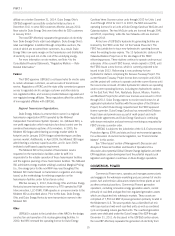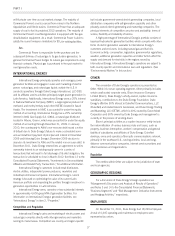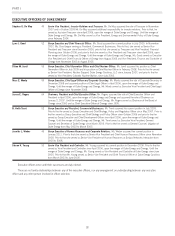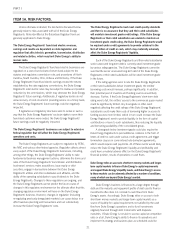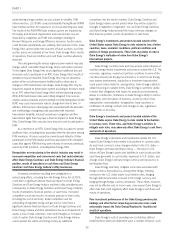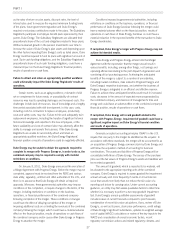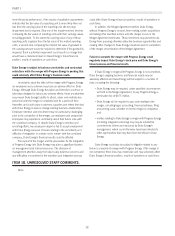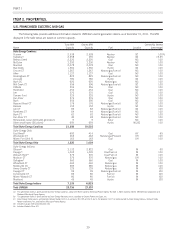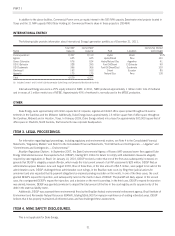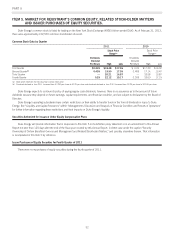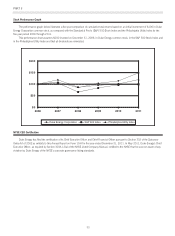Duke Energy 2011 Annual Report Download - page 43
Download and view the complete annual report
Please find page 43 of the 2011 Duke Energy annual report below. You can navigate through the pages in the report by either clicking on the pages listed below, or by using the keyword search tool below to find specific information within the annual report.
PART I
result in the imposition of fines, penalties and injunctive measures
affecting operating assets. The steps the Duke Energy Registrants could
be required to take to ensure that its facilities are in compliance could
be prohibitively expensive. As a result, the Duke Energy Registrants
may be required to shut down or alter the operation of their facilities,
which may cause the Duke Energy Registrants to incur losses. Further,
the Duke Energy Registrants’ regulatory rate structure and the Duke
Energy Registrants’ contracts with customers may not necessarily allow
the Duke Energy Registrants to recover capital costs the Duke Energy
Registrants incur to comply with new environmental regulations. Also,
the Duke Energy Registrants may not be able to obtain or maintain
from time to time all required environmental regulatory approvals for the
Duke Energy Registrants’ operating assets or development projects. If
there is a delay in obtaining any required environmental regulatory
approvals, if the Duke Energy Registrants fail to obtain and comply with
them or if environmental laws or regulations change and become more
stringent, then the operation of the Duke Energy Registrants’ facilities or
the development of new facilities could be prevented, delayed or
become subject to additional costs. Although it is not expected that the
costs of complying with current environmental regulations will have a
material adverse effect on the Duke Energy Registrants’ financial
position, results of operations or cash flows, no assurance can be made
that the costs of complying with environmental regulations in the future
will not have such an effect.
The EPA has proposed new federal regulations governing the
management of coal combustion by-products, including fly ash.
These regulations may require the Duke Energy Registrants to make
additional capital expenditures and increase the Duke Energy
Registrants’ operating and maintenance costs.
Additionally, other potential new environmental regulations,
limiting the use of coal acquired from mountaintop removal and
imposing additional requirements on water discharges associated with
mountaintop removal, could require the Duke Energy Registrants to
increase costs of fuel and make additional related capital expenditures.
In addition, the Duke Energy Registrants are generally responsible for
on-site liabilities, and in some cases off-site liabilities, associated with
the environmental condition of the Duke Energy Registrants’ power
generation facilities and natural gas assets which the Duke Energy
Registrants have acquired or developed, regardless of when the
liabilities arose and whether they are known or unknown. In connection
with some acquisitions and sales of assets, the Duke Energy
Registrants may obtain, or be required to provide, indemnification
against some environmental liabilities. If the Duke Energy Registrants
incur a material liability, or the other party to a transaction fails to meet
its indemnification obligations to the Duke Energy Registrants, the Duke
Energy Registrants could suffer material losses.
The Duke Energy Registrants are involved in numerous legal
proceedings, the outcome of which are uncertain, and resolution
adverse to the Duke Energy Registrants could negatively affect the
Duke Energy Registrants’ financial position, results of operations or
cash flows.
The Duke Energy Registrants are subject to numerous legal
proceedings, including claims for damages for bodily injuries alleged
to have arisen prior to 1985 from the exposure to or use of asbestos
at electric generation plants of Duke Energy Carolinas. Litigation is
subject to many uncertainties and the Duke Energy Registrants
cannot predict the outcome of individual matters with assurance. It is
reasonably possible that the final resolution of some of the matters in
which the Duke Energy Registrants are involved could require the
Duke Energy Registrants to make additional expenditures, in excess
of established reserves, over an extended period of time and in a
range of amounts that could have a material effect on the Duke
Energy Registrants’ cash flows and results of operations. Similarly, it
is reasonably possible that the terms of resolution could require the
Duke Energy Registrants to change the Duke Energy Registrants’
business practices and procedures, which could also have a material
effectontheDukeEnergyRegistrants’ financial position, results of
operations or cash flows.
The Duke Energy Registrants’ results of operations may be
negatively affected by overall market, economic and other
conditions that are beyond the Duke Energy Registrants’ control.
Sustained downturns or sluggishness in the economy generally
affect the markets in which the Duke Energy Registrants operate and
negatively influence the Duke Energy Registrants’ energy operations.
Declines in demand for energy as a result of economic downturns in
the Duke Energy Registrants’ franchised electric service territories will
reduce overall sales and lessen the Duke Energy Registrants’ cash
flows, especially as the Duke Energy Registrants’ industrial customers
reduce production and, therefore, consumption of electricity and gas.
Although the Duke Energy Registrants’ franchised electric and gas
business is subject to regulated allowable rates of return and recovery
of certain costs, such as fuel under periodic adjustment clauses,
overall declines in electricity sold as a result of economic downturn or
recession could reduce revenues and cash flows, thus diminishing
results of operations. Additionally, prolonged economic downturns
that negatively impact the Duke Energy Registrants’ results of
operations and cash flows could result in future material impairment
charges being recorded to write-down the carrying value of certain
assets, including goodwill, to their respective fair values.
The Duke Energy Registrants also sell electricity into the spot
market or other competitive power markets on a contractual basis. With
respect to such transactions, the Duke Energy Registrants are not
guaranteed any rate of return on the Duke Energy Registrants’ capital
investments through mandated rates, and the Duke Energy Registrants’
revenues and results of operations are likely to depend, in large part,
upon prevailing market prices in the Duke Energy Registrants’ regional
markets and other competitive markets. These market prices may
fluctuate substantially over relatively short periods of time and could
reduce the Duke Energy Registrants’ revenues and margins and thereby
diminish the Duke Energy Registrants’ results of operations.
Factors that could impact sales volumes, generation of electricity
and market prices at which Duke Energy is able to sell electricity are
as follows:
• weather conditions, including abnormally mild winter or
summer weather that cause lower energy usage for heating or
cooling purposes, respectively, and periods of low rainfall that
decrease the Duke Energy Registrants’ ability to operate its
facilities in an economical manner;
23




